Elites are Using Climate Hysteria to Immiserate the Working Class
Few things in life are as predictable as the rhetoric of climate change summits like this coming week’s in Glasgow. Over the next week, you will hear again and again that the planet is dying and that climate change will cause mass dislocations and starvation. The end is nigh, the UN has told us, and only green house gas reducing penance can save us.
We have been hearing this now for decades, with each global confab upping the ante, insisting that with the inevitable denouement, “not enough” is being done and what we need is to get more militant. And this despite whatever progress has been made.
The climate industrial complex, as economist Bjorn Lonborg has aptly called the climate doomsday crowd, has persuaded the media to indulge consistent exaggeration and predictions that link virtually any weather event— droughts, floods, hurricanes or heavy rains—directly to human caused climate change. As President Obama’s undersecretary of energy for science, physicist Steve Koonin, pointed out, the most widely reported projections reflect only highly improbable worse case scenarios based on such things as ever growing coal usage and no significant technological improvement.
Increasingly, even climate scientists are noting that the constant, and often poorly supported doomsaying threaten the credibility of the movement itself. And there have been quiet reversals; the more extreme predictions have been abandoned or walked back, even by the UN itself. And yet, in the U.S., the vast majority of young Americans continue to believe that we face imminent environmental catastrophe. And Canadian psychologists have found elevated levels of anxiety among young people, some of whom see climate as justifying the decision to not have offspring—not surprising given that they are constantly told that their world will be coming to a catastrophic end.
Of course, some climate change is real and deserving of our attention; it needs to be addressed. But what we need to combat it is not despair, but rather, a willingness to face future climate changes of any kind, including those that may be induced by human activities, with positive effort. The environmental movement needs to give up “utopian fantasies,” writes Ted Nordhaus, a longtime California environmentalist, and “make its peace with modernity and technology.”
A mix of diverse options from nuclear power and hydroelectric generation to replacing coal with abundant, cleaner natural gas and geothermal, as well as entirely new innovations could reduce emissions over time without catastrophic economic and social consequences. This is particularly true in the developing world that remains critically short of reliable, affordable energy.
Read the rest of this piece at Newsweek.
Joel Kotkin is the author of The Coming of Neo-Feudalism: A Warning to the Global Middle Class. He is the Roger Hobbs Presidential Fellow in Urban Futures at Chapman University and Executive Director for Urban Reform Institute. Learn more at joelkotkin.com and follow him on Twitter @joelkotkin.

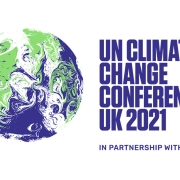
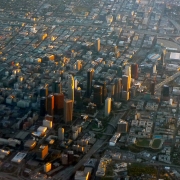 D. Ramey Logan, used under CC 4.0 License
D. Ramey Logan, used under CC 4.0 License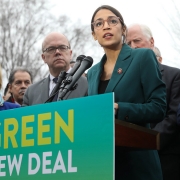 Senate Democrats, used under CC 2.0 License
Senate Democrats, used under CC 2.0 License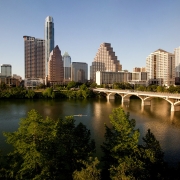
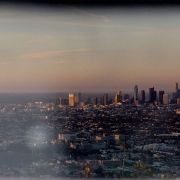
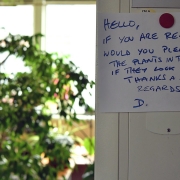
 DonkeyHotey, via Flickr, under CC 2.0 License
DonkeyHotey, via Flickr, under CC 2.0 License
 Paul Farmer, republished under CC 2.0 License
Paul Farmer, republished under CC 2.0 License